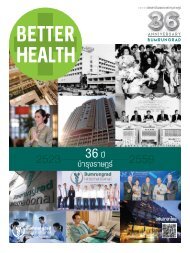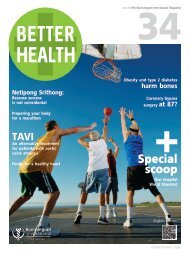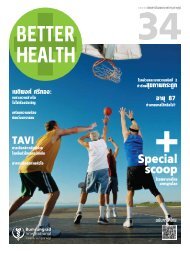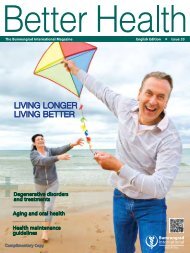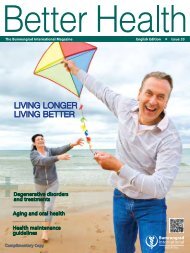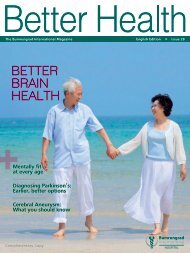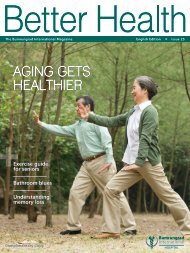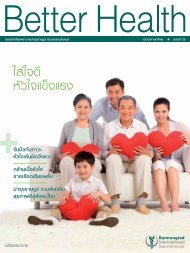All pdf BH Issue 33 Eng
Create successful ePaper yourself
Turn your PDF publications into a flip-book with our unique Google optimized e-Paper software.
AGING & ORAL HEALTH<br />
A healthy mouth leads to<br />
a healthy life<br />
Maintaining excellent oral health supports your overall<br />
health and life quality much more than you might expect.<br />
Thus, geriatric dentistry is a key component of<br />
Bumrungrad’s multidisciplinary team that provides holistic<br />
health care to elders. Our geriatric dental professionals<br />
provide care for seniors with a variety of oral health<br />
programs, whether simply for maintenance or for more<br />
serious conditions.<br />
talks with Dr. Matana Kettratad D.D.S., who<br />
is specially trained in geriatric dentistry. Her practice focuses<br />
on age-related oral diseases and<br />
preventative oral health care.<br />
Dr. Matana Kettratad<br />
Geriatric dentist<br />
Older mouths require<br />
concerted care<br />
Common oral health problems<br />
in seniors include dental caries<br />
(tooth decay), dental attrition,<br />
gingival recession; problems with<br />
implants and false teeth (looseness<br />
or friction), xerostomia, angular<br />
cheilitis, and periodontitis (also<br />
known as pyorrhea), which<br />
typically accompanies diabetes.<br />
Elders with health problems need<br />
special mouth care, especially<br />
those with multiple chronic diseases who take multiple<br />
medications; and cancer patients undergoing radiation<br />
therapy around the head or throat, which affects the salivary<br />
glands, which increases the risk for caries and mouth ulcers.<br />
“If elders don’t address these problems, they may have<br />
difficulty eating and may have a decreased appetite. This<br />
can eventually lead to malnutrition,” Dr. Matana says.<br />
“Patients at risk for respiratory infections also need to avoid<br />
oral infections because germs in the mouth can infect<br />
the lungs.”<br />
Simple ways to a healthy smile<br />
People’s mouths change as they age, which means they<br />
must adapt to changes in their oral healthcare. For example,<br />
older people’s sense of taste changes. Aging mouths produce<br />
a thinner oral soft tissue. When accompanied with dry<br />
mouth as a side effect of multiple medications, some elders<br />
may easily develop ulcers, a burning sensation, or become<br />
sensitive to spicy foods. These signs indicate that their<br />
current method of oral care is no longer sufficient.<br />
Dr. Matana suggests that seniors:<br />
Use fluoride toothpaste and have it in contact with teeth<br />
for at least two minutes during brushing.<br />
Floss or use interproximal brushes daily. Dental floss<br />
and brush size depend on the size of gaps between teeth.<br />
Those with xerostomia or insufficient saliva can stimulate<br />
saliva glands by eating foods with fiber and frequently<br />
sipping water. The doctor may suggest using artificial<br />
saliva for more severe cases.<br />
Eat foods high in fiber to stimulate chewing, which helps<br />
to scrape and clean the teeth.<br />
Avoid sugary foods, which can cause dental caries.<br />
See a dentist regularly.<br />
“Oral health and overall health are inextricably related,”<br />
Dr. Matana emphasizes. “But while elderly people need<br />
special attention, younger people should also take good<br />
care of their teeth and gums to minimize problems as they<br />
age. Good oral health affects the quality of life, regardless<br />
of how old you are!”<br />
12



